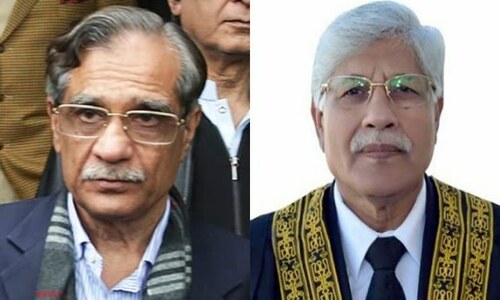Chief Justice of Pakistan Gulzar Ahmed on Saturday vehemently denied that the judiciary was being influenced by or taking dictation from other institutions as he maintained that the courts in the country were free to conduct their business.
The chief justice was responding to comments made by former president of the Supreme Court Bar Association, Ali Ahmad Kurd, earlier during the Asma Jahangir Conference in Lahore.
While commenting on the topic of the conference — "Role of Judiciary in Protecting Human Rights and Strengthening Democracy" — Kurd had directed a barrage of criticism towards the judiciary.
"One general is dominating a country of 220 million people. This same general has sent the judiciary down to number 126 [in rankings]," he said, possibly referring to World Justice Project's Rule of Law Index 2021, on which Pakistan ranks 126th in the category of fundamental rights.

Kurd, in his speech, said that there was a "clear and observable division" within the judiciary, adding that the country's "intellectual class was finished" and "because there is no intellectual class, people of small stature are sitting at the top."
In his response to Kurd later in the conference, CJP Gulzar said he "absolutely did not agree" with the assessment made by the senior lawyer. He rubbished the allegation that "our courts are not free" and that "we are working under someone's pressure or of the institutions."
"At least I do not recall any such instance," he said.
"I have not taken pressure of any institution or listened to any institution. No one tells me or guides me on how to write my verdict. I have never made any decision that I did so on someone else's saying, nor has anyone had the courage to say anything to me."
CJP Gulzar reiterated that no one interfered with his work and that he ruled on his cases according to "my understanding and conscience", adding that "I have never listened, seen, understood or felt anyone's dictation to me," he added.
"My court gives justice to the people. Come to the court Ali Ahmad Kurd and see what is happening. Read the court's decision and see what is happening. My judges write judgements every day [...] see how our court is working with freedom and following the law and implementing the Constitution."
The chief justice said it was wrong to give "such generalised statements without quoting any [specific] instance", adding that even if a mistake is made, "it is [eventually] corrected."
Justice Gulzar said the courts were free to decide whatever they wanted to do and did so routinely. "Tell me which case was decided on whose dictation till today," he said as he advised Kurd to "not tell wrong things to people, create discord and lift the people's trust from the institutions."
'Judicial organ of the state mustn't bury head in the sand'
Meanwhile, Islamabad High Court Chief Justice Athar Minallah acknowledged some of Kurd's criticism during his speech prior to CJP's.
Justice Minallah expressed his gratitude towards Kurd because "it is very important for us to know what the bar and what the people think about us."

"Let me assure Mr Ali Ahmad Kurd that no judge who is independent can ever make an excuse that he can be pressurised or influenced. Any such excuse ... I'm afraid ... is a violation of the oath," he said.
The IHC chief justice said judgements in cases such as the Mohtarma Nusrat Bhutto case and the Zafar Ali Shah case were part of history and could not be erased. "These judgements were responsible for the making and enabling of those that have been referred to by Mr Ali Ahmad Kurd," Justice Minallah noted.
Justice Minallah said the judicial organ could not afford to "bury its head in the sand and ignore its mistakes".
































